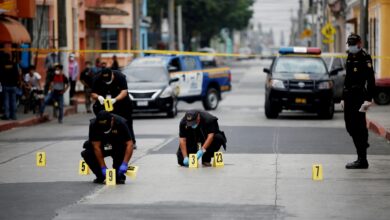Ecuador Withdraws from Arms Deal with US to Avoid Involvement in Ukraine Conflict

Ecuador’s decision to cancel a controversial arms deal with the United States to avoid involvement in the Ukraine conflict underscores a broader Latin American trend of cautious international arms trade engagement to maintain neutrality and focus on internal security challenges.
Ecuador’s Pivot: Abandoning Controversial Arms Deal
In a move that underscores the complexities of international arms agreements and their implications for global diplomacy, Ecuador has decided to abandon a controversial arms exchange deal with the United States. President Daniel Noboa announced the decision after it came to light that the outdated Soviet-era weapons, which were to be traded, would ultimately be sent to Ukraine amidst its ongoing conflict.
This decision marks a significant moment for Ecuador, a nation currently facing internal challenges, including a dramatic escalation in security concerns. President Noboa, in his efforts to combat the rising tide of violence within Ecuador, has gone as far as to classify 22 criminal organizations as terrorist groups, highlighting the severity of the country’s security situation.
Initially, the deal promised a substantial boost to Ecuador’s military capabilities. In exchange for the Soviet-era “junk” arms, the United States had pledged to provide Ecuador with $200 million worth of new weaponry. This arrangement was perceived as a crucial step in modernizing Ecuador’s armed forces and enhancing its ability to maintain internal security.
Revelation and Termination
However, the revelation that these arms would be redirected to the battlefields of Ukraine prompted a swift reevaluation by the Ecuadorian government. President Noboa, expressing his country’s stance in an interview with CNN, emphasized Ecuador’s desire to remain neutral in the conflict and avoid any actions that could be construed as contributing to the war effort in Ukraine. “To our surprise, the United States has communicated publicly that it will take (the arms) for the armed conflict in Ukraine, in which we do not want to take part, nor do we want to triangulate weapons for it,” Noboa stated, thereby signaling the deal’s termination.
International Ramifications and Russia’s Stance
The aborted arms exchange has also drawn attention from other international actors, notably Russia, which has a significant commercial relationship with Ecuador. The Russian Foreign Ministry had earlier criticized the deal, with Ecuador acknowledging the validity of Russia’s concerns regarding the potential for arms triangulation.
Ecuador’s decision to withdraw from the arms deal with the United States reflects regional apprehensions about becoming entangled in external conflicts. Across Latin America, nations are increasingly vigilant about their involvement in international arms trade agreements, wary of their potential to inadvertently contribute to conflicts beyond their borders. Countries such as Brazil, Argentina, and Mexico have also expressed reservations about arms deals that could implicate them in global geopolitical tensions in recent years.
Also read: Ecuador’s Makes Bold Move Hiking VAT to Fund Anti-Crime Efforts Amid Fiscal Challenges
As Ecuador steps back from this deal, the move underscores a growing trend in Latin America towards cautious engagement in the international arms trade, prioritizing national security interests and diplomatic neutrality over potentially problematic alliances. This incident not only highlights the intricate web of considerations that countries must navigate in the global arms market but also serves as a reminder of the unintended consequences that can arise from such dealings.




